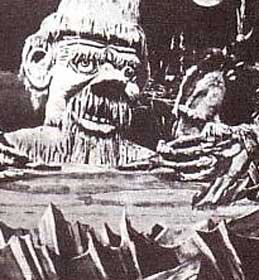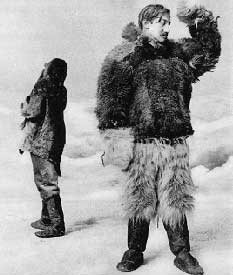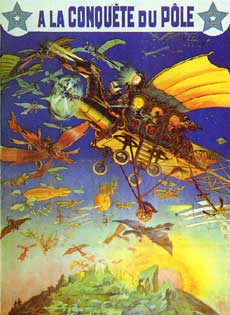 About ten minutes originally & a bit over eight minutes in most copies in circulation, Georges Melies' science fiction tale Conquest of the North Pole (La Conquete du Pole Nord, 1912) takes advantage of the public's intense interest in polar expeditions. About ten minutes originally & a bit over eight minutes in most copies in circulation, Georges Melies' science fiction tale Conquest of the North Pole (La Conquete du Pole Nord, 1912) takes advantage of the public's intense interest in polar expeditions.
Inspired by Jules Verne, the film opens with engineering professor Mabouloff (Melies) among other chaps, all dressed rather like banditos for some odd reason of fashion, planning an expedition to the North Pole by aeroplane. The unusual flight machine is built, & the crew takes off.
A hot air balloon attempt is being made by rival explorers. But before the balloon is even out of Paris the adventurers experience their first catastrophe, as someone falls out of the balloon's basket, lands with a church steeple rammed up their rear end, & explodes into smoke. The balloon goes straight up into the sky & blows up, kiling everyone.
Melies had some sense of humor.
The next attempt is by futuristic racing autos which, alas, drop into a crevice never again to be seen.
The aeroplane is still enroute, however, bumping into & exploding a low-orbiting laughing planet & other heavenly bodies, & passing a chorus of pretty girl-stars.
The Scorpion constellation whips the plane with its tail & nearly crashes it. They land at the mysterious Pole which looks uncannily like the Moon in Melies' best known film, A Trip to the Moon (La Voyage dans la lune, 1902).
An ice-giant rises up out of the pole, breathing steam from his nostrils, but he seems quite friendly playing with the polar explorers like they were toys. In the complete print the ice giant eats one of the explorers, but most copies in circulation don't include those couple seconds of incident. In either case, everyone's scared until the giant sinks back into the ice. In the last scene we see the leader of the expedition hailed in Paris.
Melies' film is a delightful fantasy which captures visually scenes that were common in "boy's fiction" of the era, on a topic that was all the rage. Perry had reached the North Pole only three years earlier, becoming a signal hero throughout the world.
 The Truth about the Pole (1912) was a self-promotional docudrama in which producer Frederick A. Cook sought to have himself treated as a heroic adventurer who disocvered the North Pole, a claim he'd been making since 1909. No director wanted credit for making it. The Truth about the Pole (1912) was a self-promotional docudrama in which producer Frederick A. Cook sought to have himself treated as a heroic adventurer who disocvered the North Pole, a claim he'd been making since 1909. No director wanted credit for making it.
Cook plays the starring role as himself. There is at least one appealing set that attempts to be naturalistic, showing a frozen ship in the distant background. Mostly it all looks pretty hoky.
It's interesting how little one needs for a quick jaunt to the Pole, a log-book, sled, & American flag being the whole of it. All one requires to recover from such an easy stroll is a nice wooden hut & one sip of coffee from a tin cup.
A silent film villain, Harry Whitney, is the evil scoundrel who started the rumor that Cook's former claim to have climbed Mt McKinley was a fabrication. This was (according to the revisions proposed by this film) Whitney's newest salvo in a campaign to make Cook's polar expedition appear to have been a hoax.
Cook, who in real life had no log of his alleged trek to the Pole, always claimed he had entrusted those documents to Whitney who soonafter became a foe. This film presents Cook's claims as facts.
As an adventure film it all seems to have been cococted by someone who didn't care to bother with making any of it credible, but just wanted to villify everyone who insisted he never made it to the Pole, everyone who denied they were all bribed to declare Cook himself the fraud.
And Cook would put this film to use on his lecture circuit in vaudeville houses. He drummed up enough artificial doubt about his detractors' motives that to this day there is a small naive or nutty coterie of Cook defenders who would have him be the first man to the North Pole.
Cook was a slippery sort of dude who would eventually serve time in prison for stock fraud. A realistic view of Cook's behavior in detail begs no controversy at all; he was caught out in all sorts of lies, including a claim that he had dispatched a ship to Greenland to fetch the proofs of his alleged journey, when at no time was such a ship dispatched. Just as O.J. Simpson isn't really funding an ongoing investigation of who killed his wife & her gay buddy.
There is too much evidence to deny that Cook hoaxed the world about his McKinley ascent, so really no reason to believe anything he claimed. The most generous assessment would be that he did make the hunting journey around some of the Arctic islands, but never went to the geographic pole per se. Claiming he did had cache that a guided hunting trip lacked.
copyright © by Paghat the Ratgirl
|


